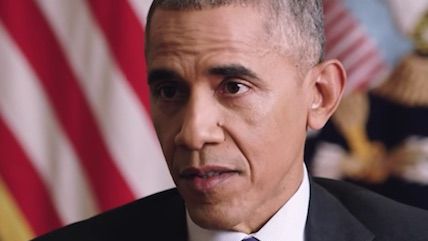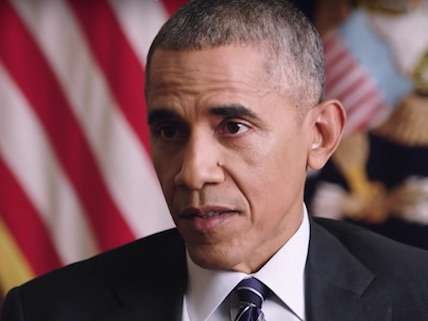President Obama on Political Correctness: 'Don't Go Around Just Looking for Insults'
In an NPR interview, the president explained the difference between being polite and being politically correct.


During a recent interview with NPR, President Obama was asked if Donald Trump was right: has political correctness gone too far?
"This is a tricky issue," Obama answered. "Because the definition of political correctness is all over the map. I suspect the president-elect's definition would be different than mine."
The president then offered two definitions of political correctness: the first is simply having good manners. It's wrong to shout racial epithets at people, or to verbally harass them. Objecting to abusive treatment isn't an example of political-correctness-run-amok—or if it is, then political correctness is a good thing. Most people probably want to live in a country where people are encouraged not to scream obscenities at each other.
The second definition of political correctness, according to Obama, is "hypersensitivity that ends up resulting in people not being able to express their opinions at all without someone suggesting they're a victim."
He continued:
My advice to progressives like myself, and advice I give my daughters who are about to head off to college is don't go around just looking for insults. You're tough. If someone says something you don't agree with, engage them on their ideas, but you don't have to feel that somehow because you're a black woman, you're being assaulted. But speak up for yourself.
The president went on to point out that when it comes to political correctness, conservatives are hypocrites. They routinely get themselves worked up, and cite offense, over silly slights, as the Cato Institute's Alex Nowrasteh pointed out in a recent op-ed for The Washington Post:
But conservatives have their own, nationalist version of PC, their own set of rules regulating speech, behavior and acceptable opinions. I call it "patriotic correctness." It's a full-throated, un-nuanced, uncompromising defense of American nationalism, history and cherry-picked ideals. Central to its thesis is the belief that nothing in America can't be fixed by more patriotism enforced by public shaming, boycotts and policies to cut out foreign and non-American influences.
Insufficient displays of patriotism among the patriotically correct can result in exclusion from public life and ruined careers. It also restricts honest criticism of failed public policies, diverting blame for things like the war in Iraq to those Americans who didn't support the war effort enough.
It's important to point out double standards. Nowrasteh and Obama are right: conservatives play the victim card, too. That's one big reason that I doubt Trump will follow through on his campaign promise to destroy political correctness. His supporters are just as PC about the kinds of symbolic gestures that matter to them.
And while it's been largely true in the Age of Obama that liberals were the ones pushing political correctness and viciously silencing their opponents on college campuses, PC is not a left vs. right issue. It's about free speech and tolerance vs. identity collectivism and censorship. And there are plenty of right-leaning forces that want to silence their enemies—even with respect to college campuses. Just yesterday, it was reported that a Republican legislator wants to punish the University of Wisconsin for allowing a liberal professor to teach a class on "The Problem of Whiteness." Meanwhile, Turning Points USA has compiled a watchlist of liberal professors saying things that violate patriotic correctness.
"It cuts both way," said Obama. "My advice to young people and to all of us as citizens is to be able to distinguish between being courteous and being thoughtful… versus having legitimate political debates and disagreements."
The president, to his credit, has consistently denounced the excesses of self-victimization on college campuses. Obama's Education Department, however, was a big part of the problem—and one he stubbornly failed to correct throughout his time in office.


Show Comments (162)